Millions of red crabs invade streets amid annual migration on Australia’s Christmas Island
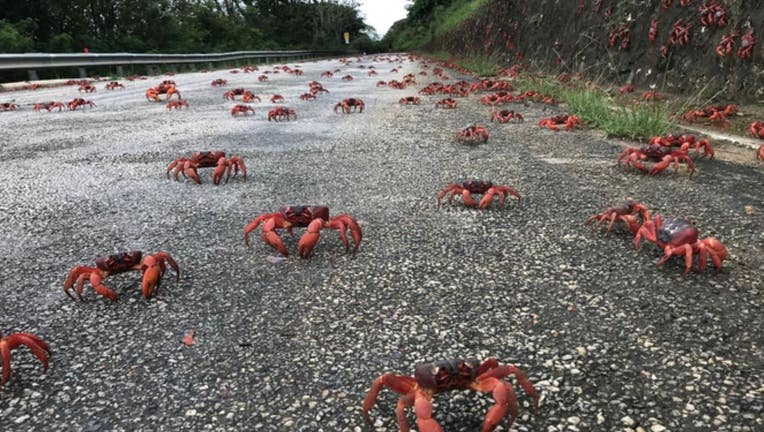
Thousands of red crabs are seen walking on a road on November 23, 2021 in Christmas Island. The annual migration of red crabs begins with first rains of the wet season on Christmas Island, usually around October or November. Millions of the red crabs
CHRISTMAS ISLAND, Australia - Millions of red crabs have emerged from their burrows and the rainforests on Australia's Christmas Island to begin their annual migration to the ocean, leading to quite a surreal scene.
Videos shared on social media show countless crabs crawling over grassy surfaces, rocks, roads — and even over people.
The annual migration begins after the first rainfall of the wet season, according to Parks Australia. That's usually sometime in October or November, but it can sometimes be as late as December or January.
When the migration begins, red crabs from all over the island march to the ocean to mate.
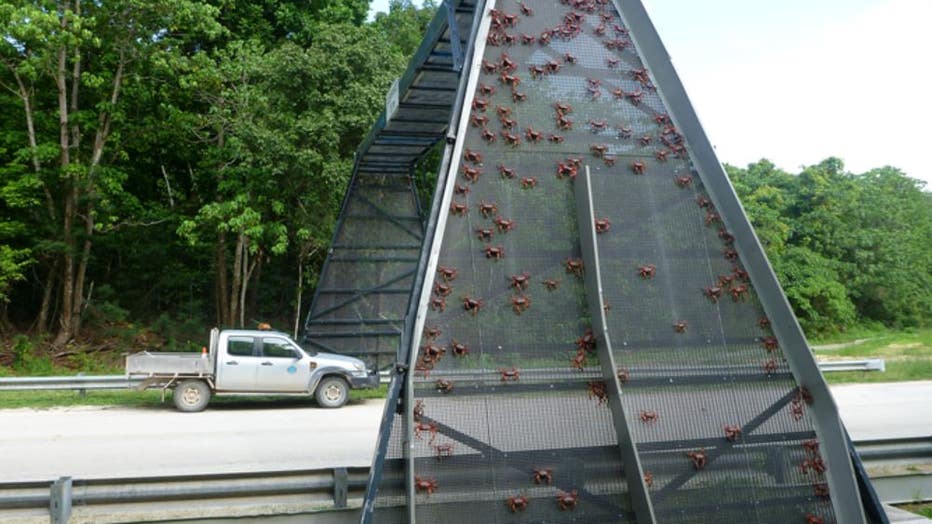
Thousands of red crabs are seen walking over a crab bridge on November 23, 2021 in Christmas Island. The annual migration of red crabs begins with first rains of the wet season on Christmas Island, usually around October or November. Millions of the
Male crabs lead the migration, and females join the group along the way.
'WE'RE ALL FAMILY NOW!': AUSTRALIAN WEDDING CEREMONY DELAYED DUE TO FEISTY FIGHTING KANGAROOS
The exact timing and speed of the migration all have to do with the phase of the moon. Parks Australia says the red crabs always spawn before dawn on a receding high tide during the last quarter of the moon – and they all know the exact time to leave their homes to make the lunar date.
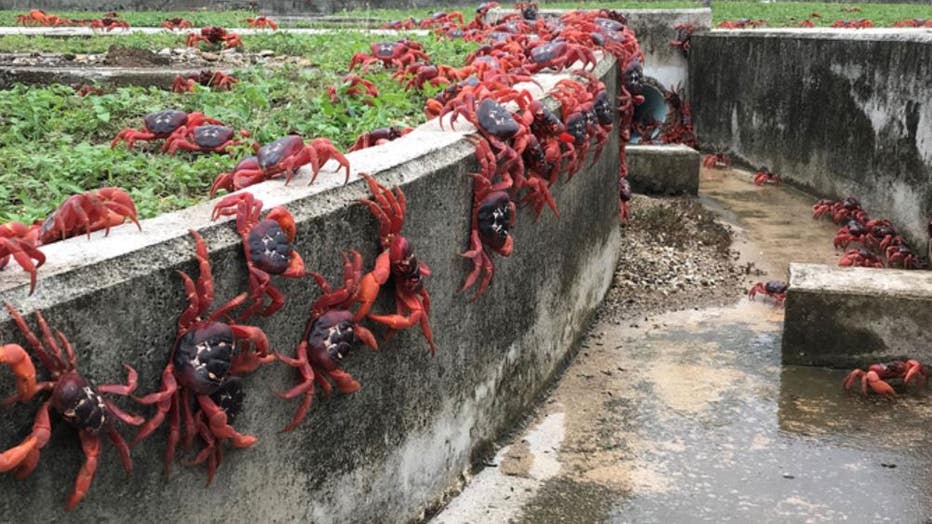
Thousands of red crabs are seen walking in a drain on November 23, 2021 in Christmas Island. The annual migration of red crabs begins with first rains of the wet season on Christmas Island, usually around October or November. Millions of the red crab
But because the red crabs wait until the first rain to begin their march, they sometimes need to make it a quick trip.
They move fast if the first rain arrives close to their spawning date. But if the rain comes early, they like to take their time to have a snack or take a drink along the way.
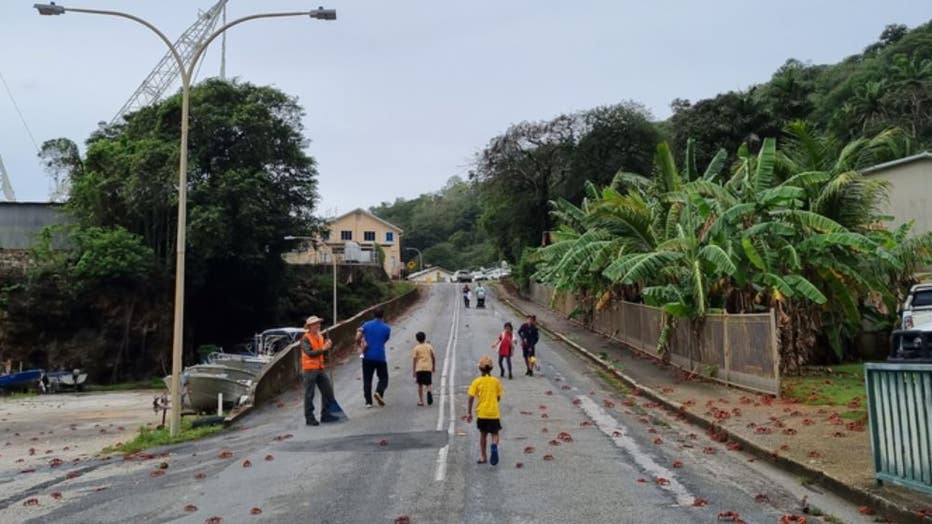
Members of the public and Parks Australia staff rack away thousands of red crabs off a road on November 8, 2021 in Christmas Island. The annual migration of red crabs begins with first rains of the wet season on Christmas Island, usually around Octob
If the first rain comes too late to make the spawning date, they'll hang around at home and wait for the next lunar target the following month, according to Parks Australia.
WATCH: MASSIVE AMOUNTS OF WATER SPILLS FROM AUSTRALIAN DAM AMID TORRENTIAL RAINS
The male crabs will arrive first, dig burrows then return to the forest after mating with the female crabs.
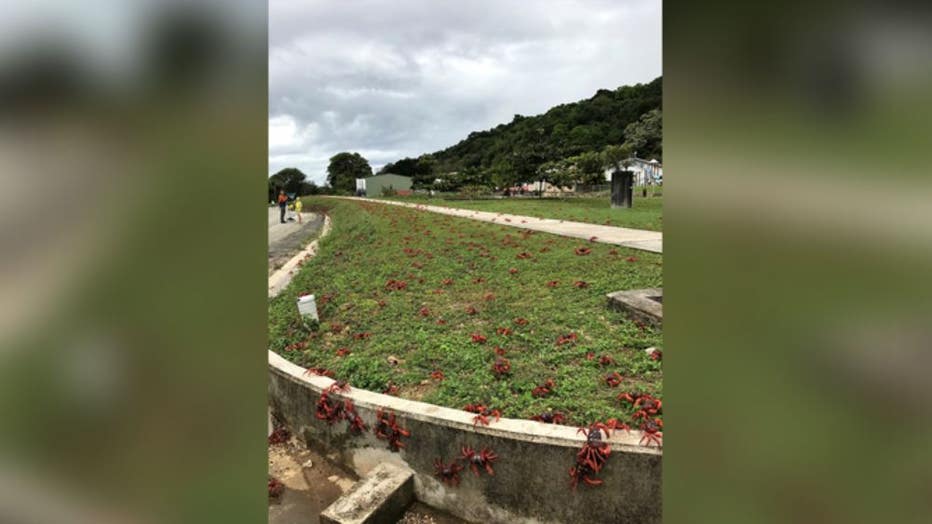
Thousands of red crabs are seen along the side of a road on November 23, 2021 in Christmas Island. The annual migration of red crabs begins with first rains of the wet season on Christmas Island, usually around October or November. Millions of the re
The females, which can produce up to 100,000 eggs each, remain in the burrows until the moon is in its last quarter and the tide starts to turn before dawn. The female red crabs release their eggs into the ocean, and the crab larvae will hatch immediately upon touching the water.
Most won't survive, but the crabs that do will hang around in small pools for about a month before making the 9-day trip back inland and into the rainforests, where they will remain, primarily hidden in rocky outcrops and forest debris, for the first three years of their life, according to Parks Australia.

A member of the public racks away thousands of red crabs off a road on November 6, 2021 in Christmas Island. The annual migration of red crabs begins with first rains of the wet season on Christmas Island, usually around October or November. Millions

